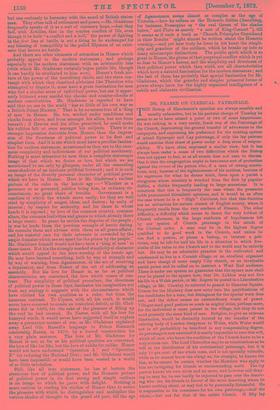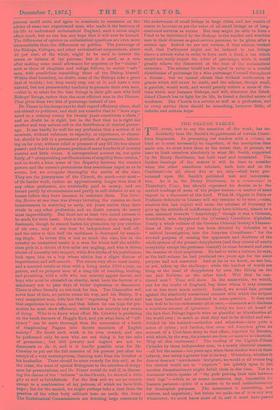DR. FRASER ON CLERICAL PATRONAGE. patrons could unite and agree
to nominate to vacancies on the advice of some one experienced man, who made it the business of his life to understand ecclesiastical England, such a union might effect much, but no one has any hope that it will ever be formed. The differences of opinion on ecclesiastical questions are even more irreconcilable than the differences on politics. The patronage of the Bishops, Colleges, and other ecclesiastical corporations, about 40 per cent. of the whole, ought to be used to correct the errors or failures of lay patrons; but it is used, as a rule after making some small allowance for nepotism or for " claims " such as those of chaplains and college fellows, to secure " safe " men, with proclivities resembling those of the Bishop himself. Within that boundary, no doubt, some of the Bishops take a great deal of trouble ; but they rarely step out of it, and have a very natural, but not praiseworthy tendency to promote their own men, —that is, to select for the best livings in their gift men who hold Bishops' livings, rather than the most efficient men in the Diocese. That gives them two bits of patronage instead of one.
Dr. Fraser in his charge says he shall regard efficiency alone, shall not attend to petitions, and shall not consider that to "have vege- tated on a country curacy for twenty years constitutes a claim ;" and no doubt he is right, but in the fact that he is right lies another and very serious evil in the distribution of clerical patron- age. It can hardly be well for any profession that a section of its members, without reference to capacity, or experience, or charac- ter, should be left in a permanent position of hopelessness, labour- ing on for ever, without relief or prospect of any till life has almost passed ; and that is the present position of many hundreds of country curates and little vicars. A correspondent accuses us, not quite fairly, of" always taking our illustrations of stupidity from curates," and no doubt a keen sense of the disparity between the curate's powers and the curate's pretensions does sometimes impel us to be severe, but we recognise thoroughly the merits of the class. They are the journeymen of the Church, do much—not most— of its harder work, endure an apprenticeship longer than that of any other profession, are wretchedly paid in money, and are forced partly by circumstances and partly in self-defence to set up homes before they have incomes to maintain them. The Satur- day Review at one time was always lecturing the curates on their luxurionsness in marrying so early, six years earlier than their rivals in any other profession, and no doubt curates do marry most improvidently. But there are at least two sound excuses to be made for their haste. One is that the curate, alone among pro- fessionals, though he cannot hasten his promotion by any exertion of his own, may at any hour be independent and well off ; and the other is that half his usefulness is destroyed by remain- ing single. In towns this is not so much the case, but in the country an unmarried curate is a man for whom half the middle- class girls in a circuit of five miles are angling, and who is driven almost of necessity into croquet, while five-sixths of his parishioners look upon him as a boy whose advice has a slight flavour of impertinence and self-conceit. The curate very often must marry, and a married curate or vicar with a living under 1200 a year, no patron, and no prospect save of a long life of teaching, visiting, and preaching, with a wife who can scarcely appear decent, and boys who must be educated on charity, must have the fervour of a missionary not to pass days of bitter depression or discontent. There is often literally no out-look for him. The Chancellor will never hear of him, no patron comes his way, and his Bishop, if a very competent man, tells him that " vegetating " is no claim and that experience is no claim, and that before he can hope for pro- motion he must show efficiency, which he has scarcely any means of doing. Who is to know what effect Mr. Crawley is producing on the brick-burners of Hoggle End, and yet what form of " effi- ciency " can be more thorough than the conversion of a horde of blaspheming Pagans into decent members of English society ? No doubt such work is its own reward, and can be performed only by men who are not doing it for the sake of promotion ; but still poverty and neglect are not in- ducements to do it, and it is hardly possible even for Mr. Crawley to put out the full measure of his powers just after the receipt of a very contemptuous, dunning note from his butcher or his bookseller. There should be some remedy for this evil, as for the other, the want of special fittingness in the selection of clergy- men for presentations, and Dr. Fraser would do well if, in discuss- ing the claims of the " failures" in the Church, he showed a little pity as well as faithfulness. For the firs& evil we see no remedy except in a combination of lay patrons, of which we have little hope; but for the second, we might perhaps take a hint from the practice of the other body militant here on earth, the Army. The Ecclesiastical Commissioners are devoting large resources to
the endowment of small livings in large cities, and are unable of course to increase as yet the value of all small livings or of long- continued services as curate. But they might j3e able to form a Fund to be distributed by the Bishops to the needier and worthier men in their dioceses as good-service pensions, to be given after a certain age. Indeed we are not certain, if that scheme worked well, that Parliament might not be induced to tax livings above a certain value in order to form such a fund, a tax which would not really impair the value of patronage, while it would greatly relieve the discontent at the base of the ecclesiastical structure. The scheme would not be equal in value to a careful distribution of patronage by a wise patronage Council throughout a diocese ; but we cannot obtain that without confiscation or grants which will never be made, and the scheme, though small, is possible, would work, and would greatly relieve a mass of dis- tress which now harasses Bishops, and will, whenever the Estab- lished Church has to fight for its life, be found a decided source of weakness. The Church is a service as well as a profession, and in every service there should be something, however little, of definite and certain hope.



































 Previous page
Previous page